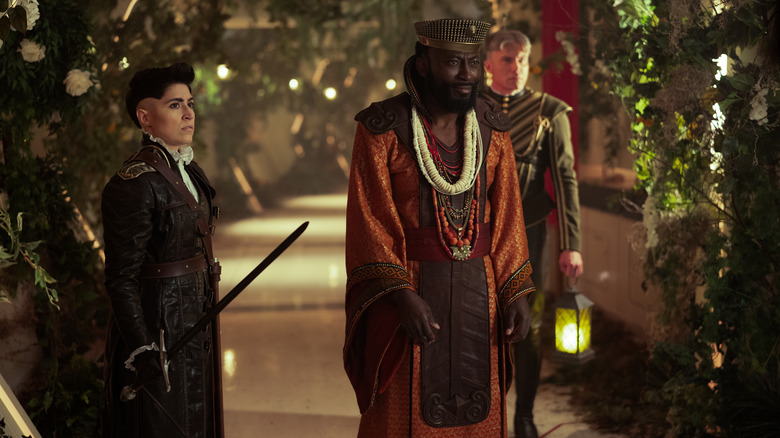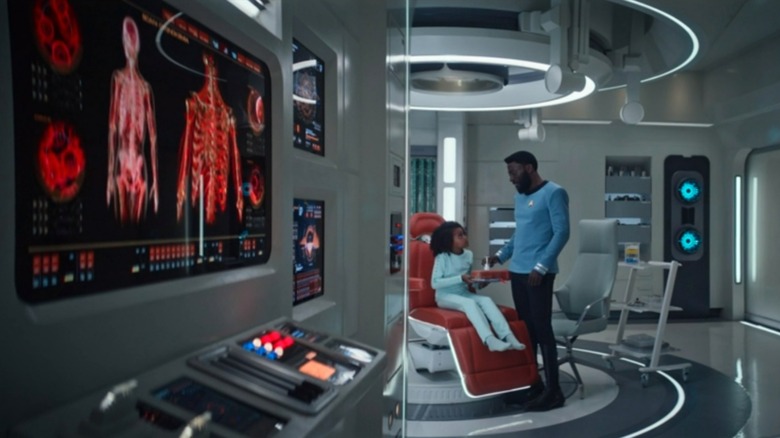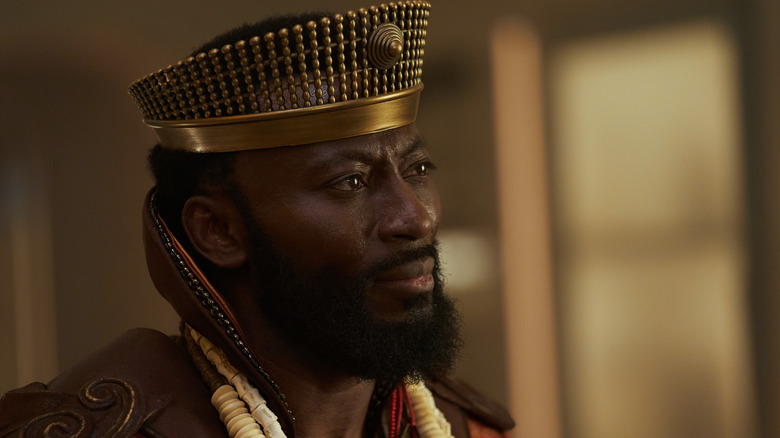How Star Trek: Strange New Worlds Just Turned Its Most Dubious Subplot Into Its Boldest Episode Yet
This post contains spoilers for the latest episode of "Star Trek: Strange New Worlds."
Think you know your "Star Trek" history? Then chances are you're also well-aware of the fact that there's simply no such thing as "too weird" when it comes to this extraordinarily thoughtful, but sometimes overambitious franchise. At one point or another, our favorite characters throughout the decades have encountered living manifestations of gods, body-swap narratives (respectfully, Dr. Crusher, we still need to talk about respecting your late grandmother's boundaries in "Sub Rosa"), mirror universes, and that profoundly disturbing "Tuvix" escapade in "Star Trek: Voyager." Sometimes, these high-concept ideas work out to incredible results against all odds. Other times, they crash and burn like Icarus flying too close to the sun. But that's all part of the fun of being a Trekkie.
So when episode 8 of "Strange New Worlds" promised to go full renaissance fair on us, longtime fans remembered "The Original Series" and "The Next Generation" (which once famously put Captain Picard and his crew in Robin Hood regalia!) and didn't even flinch. Given the sheer level of confidence on display throughout this impressive first season, it was easy to trust co-showrunners Akiva Goldsman and Henry Alonso Myers and their writers' room. If anyone would be able to turn the potential gimmick of Dr. M'Benga (Babs Olusanmokun) finding himself in a living fairytale into something genuinely substantial, it's them.
But perhaps the most important takeaway from yesterday's episode, titled "The Elysian Kingdom," has less to do with how enjoyable and meaningful it was for both casual and invested fans alike. Instead, I'd argue that its best surprise comes from taking one of the show's more questionable subplots — M'Benga's secret daughter afflicted with a terminal case of cygnokemia — and using it as the foundation for the show's boldest, most moving episode yet.
Fly in the ointment
"Strange New Worlds" hit the ground running from its very first episode, effortlessly balancing episodic storylines with ongoing character arcs and juggling tones from serious stakes to fun romps, all with easek. But even with such a high level of consistency — or perhaps partly because of it — one particular subplot in the early going couldn't help but stick out from the rest.
If there's any minor criticism to lob at this series, I would point towards its tendency to resort to tragic backstories, usually delivered through somewhat strained exposition dumps, in order to flesh out its supporting characters. In rapid succession during the first trio of episodes, there was La'an Noonien-Singh's (Christina Chong) lingering PTSD from narrowly surviving the Gorn, Nyota Uhura (Cecilia Rose Gooding) using the death of her family as motivation to join Starfleet, and finally the twist that Dr. M'Benga has been keeping his sickly daughter Rukiya (Sage Arrindell) in transporter stasis, hoping to someday find a cure so she could live a normal life again. While not a deal-breaker by any means, that last reveal still felt like one too many and a potential narrative anchor weighing down on M'Benga's future arc.
"Star Trek" has never shied away from the realities of children of Starfleet officers growing up on spaceships, admittedly. "The Next Generation" turned Wesley Crusher (Wil Wheaton) into an integral member of the bridge crew, while even "Voyager" found time to add layers to the divisive morale officer/chef Neelix (Ethan Phillips) with his relationship to his goddaughter Samantha Wildman (Nancy Hower) in later seasons. Yet with M'Benga specifically, just how much mileage could the writers possibly wring from repeated scenes of M'Benga reading to Rukiya before sending her right back into the pattern buffer?
Learning to let go
Ultimately, any criticism that Rukiya couldn't possibly reside in this status quo for long turns out to be the entire point of "The Elysian Kingdom."
Instead of continually delaying the matter of M'Benga wrestling with his responsibility to protect his daughter at the cost of her own freedom, this last episode steers directly into the skid and decisively brings this breaking point to the forefront. While exploring a nebula, the Enterprise becomes trapped by a sentient consciousness adrift in space (a classic "Trek" premise), gifting us with the gloriously goofy visuals of the cast playing hilariously against type — Anson Mount's Captain Pike as the cowardly chamberlain, Christina Chong's straight-laced La'an as the ditzy princess, and especially Melissa Navia's Ortegas as the fiery and loyal swordfighter. However, we eventually learn that this heightened reality is ripped straight from the fairy tale story M'Benga has been reading to his daughter, miraculously healing her of her afflictions and giving her a taste of childhood innocence.
This reveal brings us inexorably to the episode's heartfelt conclusion. In short, Rukiya can't remain cooped up on the Enterprise forever, and only M'Benga can decide to let her go and live a full life out in the cosmos. When he finally accepts the impossibly difficult choice he must make, this seemingly gimmicky distraction suddenly transforms into a potent metaphor for parenthood. And at its core, this surprisingly powerful story functions as a most welcome refutation, pointedly directed towards any of us who may have considered this to be the show's shakiest subplot.
With each new episode, "Strange New Worlds" continues to reward its viewers' trust. In the end, "The Elysian Kingdom" will likely stand out as the best possible example of why this creative team deserves the benefit of the doubt.


